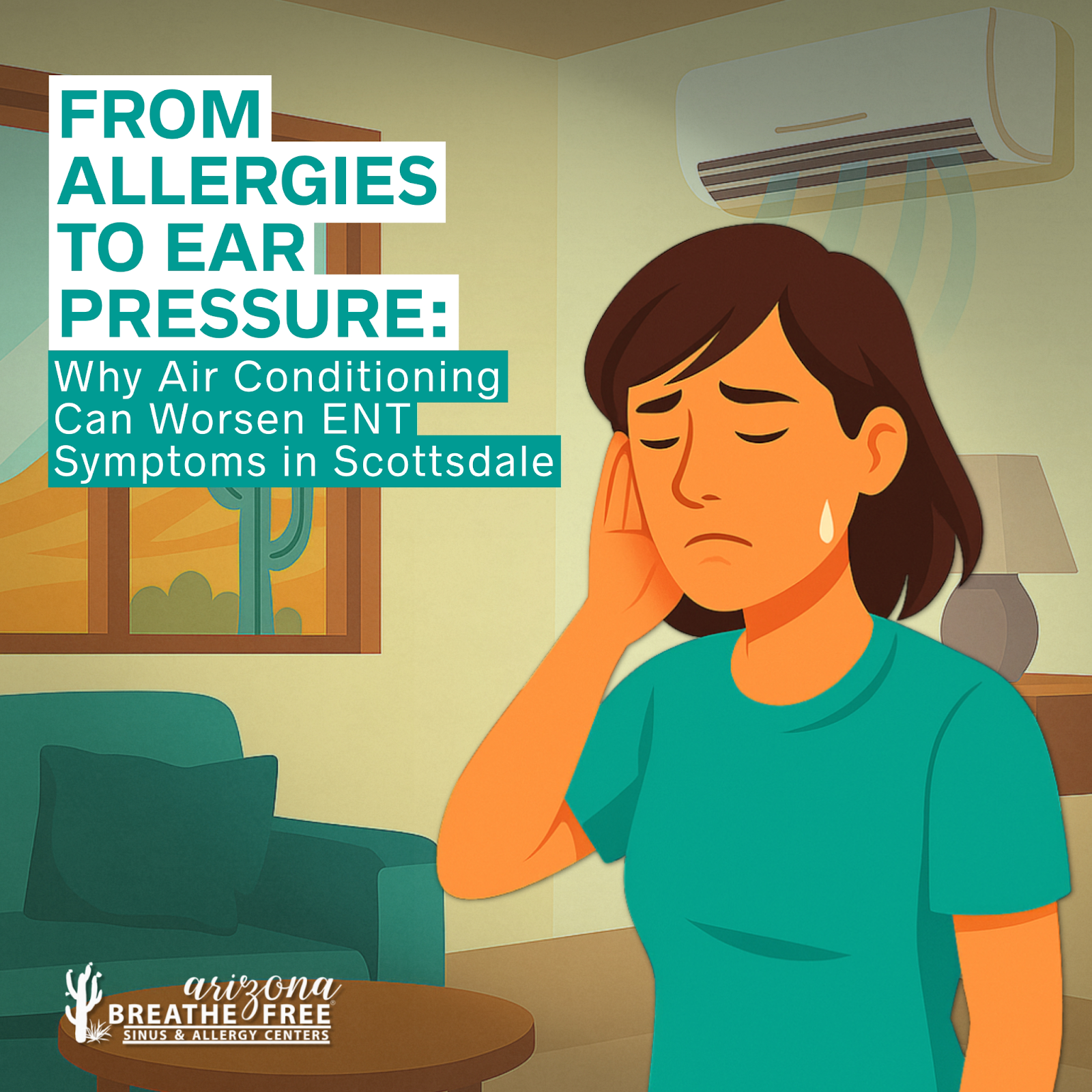From Allergies to Ear Pressure: How Scottsdale’s Air Conditioning Affects ENT Health
Arizona is known for its warm and arid climate. Residents and visitors alike enjoy sunshine year-round, with mild winters, intense summer heat, and minimal rainfall. In fact, it ranks among the sunniest regions in the United States.
To cope with the heat, many Arizona and Scottsdale residents run their air conditioning (AC) units continuously—especially during peak summer months. While AC provides essential relief, it may also have unintended effects on your ear, nose, and throat (ENT) health.

How Air Conditioning Affects ENT Health in Scottsdale
Dry Air = Sinus Irritation
Air conditioners cool indoor spaces by drawing in warm air, removing moisture, and recirculating cooler air. While this process is a lifesaver in the Arizona heat, it significantly reduces indoor humidity.
When the air becomes too dry, the mucosal lining in the nasal and sinus passages can dehydrate. This may lead to irritation, inflammation, and impaired mucus drainage—factors that can increase the risk of congestion or even infection in sensitive individuals.
Some individuals may also experience sinus pressure or symptoms of sinusitis, including discomfort around the forehead, cheeks, and nasal passages.
Indoor Allergies in Arizona Homes
Arizona’s dry, windy climate allows allergens like dust, pollen, and mold spores to travel easily—especially throughout the Phoenix Valley.
While AC systems don’t create allergens, they can spread them throughout the home. If AC filters aren’t properly cleaned or maintained, irritants like pollen, pet dander, and mold can circulate via the ductwork, potentially worsening allergy symptoms for some Scottsdale residents.
Dry, Cool Air and Sore Throat
Sleeping in an air-conditioned room may leave some people waking up with a sore, dry throat. This can result from post-nasal drip combined with the drying effect of cool air on the throat’s mucous membranes. Dehydrated tissues can make mucus more difficult to drain and clear, contributing to irritation.
Temperature Swings and Ear Pressure
Moving from hot outdoor temperatures into a cold, air-conditioned environment can also cause ear discomfort. Rapid temperature shifts may affect the function of the Eustachian tubes—small passages that help equalize pressure in the middle ear.
When these tubes don’t function properly, fluid can build up and lead to ear pressure or discomfort. Additionally, dry air may reduce the effectiveness of the mucus membranes that help block bacteria from reaching the inner ear, potentially increasing infection risk.
Tips to Support ENT Health in a Scottsdale Summer
To help maintain ENT health while staying cool in Arizona’s climate:
✅ Keep your AC set above 72°F (22°C), as excessively cold air may irritate your airways.
✅ Avoid sitting directly under or near AC vents.
✅ Consider reducing or turning off the AC at night if dryness becomes an issue.
✅ Use a humidifier or place open containers of water in rooms to help restore moisture to the air.
✅ Make sure your ears are dry before prolonged exposure to cold air.
✅ Perform regular nasal rinses to support healthy sinus function.
✅ Stay hydrated throughout the day to combat the drying effects of AC.
✅ Have your AC system professionally inspected and maintained to minimize indoor allergen buildup.
Arizona Breathe Free Can Help with ENT Symptoms in Scottsdale
Unregulated or excessive air conditioning can contribute to ENT discomfort in sensitive individuals. At Arizona Breathe Free Sinus & Allergy Centers, we understand the unique challenges of living in Scottsdale’s desert climate—and the impact it can have on your respiratory and sinus health.
If you're dealing with persistent sinus pressure, sore throat, ear discomfort, or worsening allergy symptoms, schedule a consultation with our Scottsdale ENT specialists. We’ll work with you to identify triggers and create a treatment plan that supports your health—while keeping you cool in the Phoenix Valley heat.

.png)